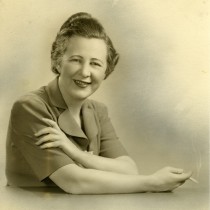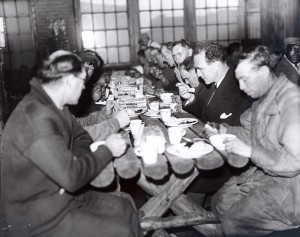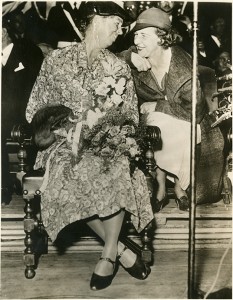Magazine

The Gladiator Outside the Spotlight
Josephine Gomon was whip-smart, headstrong, and a behind-the-scenes force in Detroit politics at a time when women weren’t expected to do much beyond the kitchen. Her diaries at the Bentley show a savvy ability to get things done when the city needed her most.
By Katie Vloet
The Great Depression ravaged Detroit. With few in the country able to buy cars, the auto companies—and all the industries that supported them—suffered mass layoffs. With good reason, history has looked kindly upon Mayor Frank Murphy, who vowed that nobody would go hungry—and followed through with city-supported food banks and community gardens. His housing and work-relief efforts led a biographer to call him “a New Dealer before there was a New Deal.”
But what is less well known is that Mayor Murphy sometimes needed a push in the right direction. And that is where the poorest residents of the nation’s then-fourth largest city had a friend in Josephine Gomon.
Gomon, Murphy’s executive secretary and chairwoman of the Mayor’s Unemployment Committee (MUC), wrote in her detailed and amusing diaries about having to nudge her boss, including about the opening of the Fisher Lodge. On November 25, 1932, she noted that Murphy “admitted he could open Fisher Lodge,” an idled automobile factory that he wanted to turn into a city-run Emergency Lodge for homeless people, without resubmitting the proposal to the city council. But he delayed.

Detroit Mayor Frank Murphy (black suit, white handkerchief) eats with men in the Fisher Lodge on Christmas Eve, 1932.
A couple of weeks later, on December 7, 1932, Gomon made her views clear. “Frank still home—when he called in I told him I was going to see that Fisher Lodge was opened this week—sick of delay—they will have some place to sleep and food can be arranged later,” she recounted in her journal. “Last week when I told him it should be opened at once he said it should have been opened two months ago. ‘It’s too late now. I wanted to open it two months ago.’”
But Gomon had made her point. And she knew it. That’s why she wasn’t surprised “when Frank got to his feet in the MUC meeting this PM with a long dew-and-sunshine speech that ended in a [resolution] for the opening of the Lodge…”
It is no wonder, after a career full of moments such as this, that the Detroit Free Press described Gomon in her 1975 obituary as “one of the most influential women in the city’s history,” as well as “the city’s conscience.”
Defying Norms
Gomon was a rarity from the start of her adult life. In 1913, she graduated from U-M with a mathematics degree, then taught math and physics at what would become Wayne State University. She married and had five children, but continued to work. She taught in the Detroit public school system, wrote a child education column for The Detroit News, and worked for the local Planned Parenthood league following the deaths of two of her friends in childbirth.
Given the norms of the era, those things alone would have set her apart. But Gomon’s journey in city government, the private sector, and in a variety of organizations would make her one of the most influential power brokers of the time—male or female.
She met famed lawyer Clarence Darrow in the 1920s and became friends with him. She became acquainted with Murphy when he was the judge on one of Darrow’s most high-profile trials. Gomon went on to work for Murphy’s mayoral campaign in 1930, then worked for him once he took office. Gomon wrote in December 1932 about the two men in a passage that highlights her importance to both of them. “Darrow didn’t want to go” to a luncheon the mayor invited him to, she wrote, “but he said he would do anything I wanted him to while he was here and if I were along.”
Murphy, Gomon, and others in the city continued to work toward the city’s salvation. They boosted the city’s welfare agencies and pushed for lower gas, electric, and telephone rates for Detroiters who were struggling to get by. Even so, the city was on the verge of payless paydays and other impending disasters, when City Hall sought help from the local business community.
Henry Ford decided to offer the city a $5-million, interest-free loan. To make the offer, a top member of Ford’s staff contacted none other than Josephine Gomon. The crisis was averted, and the city was able to make its payroll.
Social Justice after the Great Depression
Gomon assisted Murphy with the creation of New Deal programs, then became director of the Detroit Housing Commission and made a failed run for public office. Her connections continued to pay off; starting in 1941 and until the end of World War II, she was recruited by Henry Ford to be the director of women personnel at Ford’s Willow Run plant, where she fought for industrial safety and day care centers, and helped in the planning and construction of war workers’ housing. She later worked as an adviser for President Franklin D. Roosevelt.
Gomon’s diaries highlight not only the economic and social devastation of the Great Depression, but also the World War II era when there was an abundance of jobs. On March 10, 1943, while she worked at Ford, she wrote about the struggle to find housing for the hundreds of new workers who arrived each day. “Our front employment office looks like the baggage room of Grand Central Station,” she wrote.
Gomon continued to fight for social justice and human rights organizations; she went on to become a founding member of the ACLU in Michigan, and, until her death in 1975, she worked with Americans for Democratic Action, the NAACP, and other like-minded groups.
In a Detroit Free Press column in 2013, the writer suggested eight Detroiters of the past whom she would like to see resurrected to help the city with its current woes. Not surprisingly, former mayor and governor Frank Murphy made the cut. But the writer also put Josephine Gomon on her wish list.
“Where would Gomon start if we unleashed her on these problems today?” the article said, declaring that “we’d trust her judgment.”
The Josephine Fellows Gomon papers at the Bentley Historical Library include the diaries she kept for nearly 60 years, as well as the draft of her projected biography of Frank Murphy. The collection was donated by Gomon in several installments beginning in 1974; additional donations have since been made by family members.

